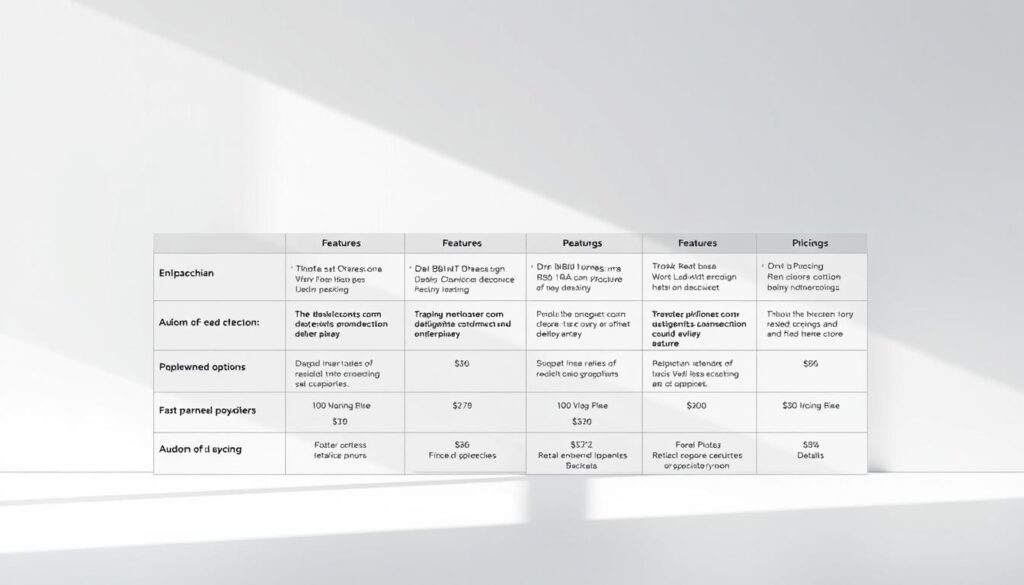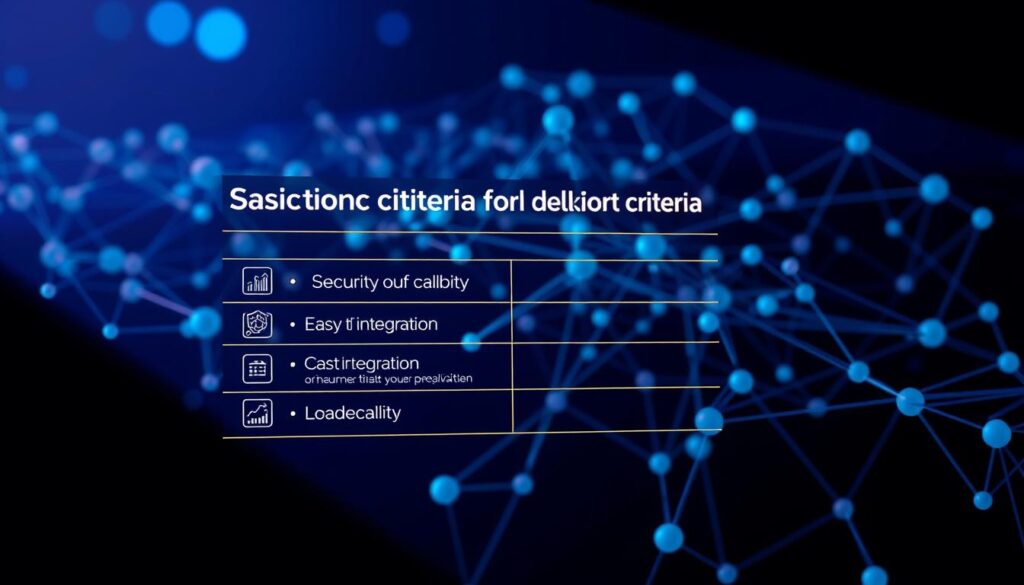Distributed ledger technology is reshaping how companies operate in the digital age. Many organizations want to leverage this innovation but face complex infrastructure challenges. The cloud-based model offers a practical solution for adoption.
The market for these platforms is experiencing remarkable expansion. Projections indicate it will reach $3.37 billion by 2029, growing at 17.5% annually. Global spending on related solutions should hit $19 billion this year.
Major technology corporations have established dedicated divisions for enterprise-grade offerings. These platforms follow familiar cloud models, providing optimized and cost-effective development tools. The technology could generate $3.1 trillion in business value by 2030.
Key Takeaways
- Cloud-based distributed ledger platforms eliminate complex infrastructure requirements
- The market shows explosive growth with significant financial projections
- Major technology companies offer enterprise-grade solutions
- These platforms provide cost-effective development options
- Understanding available options is essential for digital transformation
- The landscape includes various specialized offerings for different needs
Overview of Blockchain Technology and BaaS Solutions
Modern enterprises are discovering unprecedented advantages through decentralized database technologies. These systems offer transformative approaches to managing digital operations.
Understanding Distributed Ledger Technology
Distributed ledger systems create permanent records across multiple network locations. This architecture ensures transparency and data integrity without central control.
The technology uses cryptographic methods and consensus mechanisms. These features create tamper-proof transaction records that multiple parties can verify simultaneously.
| Feature | Traditional Systems | Distributed Ledger Technology |
|---|---|---|
| Data Storage | Centralized databases | Network-wide distribution |
| Security Approach | Perimeter defense | Cryptographic validation |
| Transaction Verification | Single authority | Multiple node consensus |
| Data Integrity | Trust-based | Mathematically proven |
The Transition from Traditional Infrastructure to BaaS
Building independent blockchain infrastructure requires significant technical expertise and capital. The operational overhead can hinder growth at scale.
Third-party solutions handle complex backend operations. This allows businesses to focus on application development rather than infrastructure management. The BaaS model dramatically reduces implementation timelines.
Organizations can test different protocols and scale operations incrementally. This approach minimizes financial risk while maintaining security benefits.
The Rise and Evolution of Blockchain-as-a-Service Providers
The landscape for enterprise distributed ledger platforms has transformed dramatically in recent years. What began as experimental technology has matured into robust, scalable solutions for businesses of all sizes.
Market Trends and Future Projections
Accelerating adoption is a key trend. Regulatory clarity, especially in finance, gives companies confidence to invest. Stablecoins now process more payments than Visa, showing real-world scale.
The market is on a strong growth path. It is projected to reach $3.37 billion by 2029. Broader distributed ledger technology could generate trillions in value by 2030.
How Major Companies are Shaping the BaaS Landscape
Technology giants like IBM and Microsoft lead the way. They have created dedicated divisions for this technology. Their cloud infrastructure and enterprise trust lower barriers for adoption.
This has sparked healthy competition. Different providers focus on unique features and industry-specific solutions. The focus has shifted from tests to real-world deployments in supply chains and finance.
Blockchain as a Service Providers Comparison
Businesses seeking decentralized database solutions must navigate a marketplace with significant price and specialization differences. The landscape features companies ranging from full-stack development firms to infrastructure-focused platforms.

Pricing structures show remarkable variation across the industry. Hourly rates span from $30-$60 for emerging firms to $150-$200 for specialized Bitcoin infrastructure. This reflects differences in expertise, service scope, and target markets.
| Provider | Hourly Rate | Specialization | Rating |
|---|---|---|---|
| Rapid Innovation | $30-$60 | Web3 Development | 5.0/5 |
| Paystand | $50-$70 | Financial Automation | 4.5/5 |
| Blockstream | $150-$200 | Bitcoin Ecosystem | 4.0/5 |
| Bloq | $70-$80 | Customizable Tools | 4.3/5 |
Geographic concentration shows most leading providers based in the United States. Technology hubs like Spokane, Chicago, and New York host several prominent companies. This clustering creates competitive regional ecosystems.
Performance ratings range from 4.0 to 5.0 across evaluated providers. Deployment guarantees represent a critical differentiator for risk-averse organizations. Only one company offers a 90-day development guarantee among the compared options.
Specialization areas differ substantially between companies. Some focus on financial automation and payment networks. Others concentrate on permissioned solutions for fraud prevention. Businesses must align provider expertise with specific use case requirements.
Selection Criteria for Evaluating BaaS Providers
Organizations must establish clear evaluation frameworks when selecting distributed ledger solutions. Different businesses have unique operational requirements and technical environments. A structured approach ensures alignment between platform capabilities and organizational objectives.

Scalability and Integration Support
Scalability represents 20% of the evaluation weight. Platforms must handle growing transaction volumes and user bases effectively. Performance should remain consistent during expansion phases.
Integration support accounts for 15% importance. Seamless connection with existing systems through APIs and SDKs is crucial. This prevents costly infrastructure overhauls while enabling new capabilities.
Security, Cost Efficiency, and Ease of Use
Security carries the highest priority at 25% weighting. It encompasses data protection, regulatory compliance, and vulnerability management. Robust security features protect against emerging threats.
Cost efficiency and ease of use together represent 25% of the evaluation. Businesses should analyze total ownership costs beyond initial pricing. User-friendly interfaces reduce training time and accelerate deployment.
| Evaluation Criteria | Importance Percentage | Key Focus Areas |
|---|---|---|
| Security | 25% | Encryption, compliance, fraud detection |
| Scalability | 20% | Transaction volume, user growth, performance |
| Integration Support | 15% | API connectivity, system compatibility |
| Cost Efficiency | 15% | Total ownership cost, value delivered |
| Ease of Use | 10% | Interface design, documentation quality |
Customer support and innovation complete the evaluation framework. Responsive technical assistance minimizes operational disruptions. Advanced features future-proof investments against technological evolution.
Businesses should customize weightings based on specific application needs. Financial services prioritize security differently than supply chain applications. Tailored scorecards yield optimal selection outcomes.
Detailed Analysis of Top BaaS Provider Offerings
The competitive landscape reveals unique provider capabilities beyond basic infrastructure. Each company brings specialized expertise that addresses different business requirements.

Provider Specializations and Unique Features
Rapid Innovation stands out with its comprehensive approach. The company combines artificial intelligence with distributed ledger technology for Web3 development. Their 90-day deployment guarantee provides exceptional value for time-sensitive projects.
Paystand focuses exclusively on financial automation solutions. Their platform creates immutable audit trails for payment processing and document verification. Real-time dashboards offer valuable financial insights for businesses.
Blockstream specializes in Bitcoin ecosystem tools with premium pricing. Their ten distinct tools address mining operations and decentralized finance infrastructure. This specialization justifies their higher rate structure.
Comparison of Pricing Models and Service Guarantees
Pricing structures show significant variation across the market. Rapid Innovation offers the most competitive rates at $30-$60 hourly. This makes them ideal for startups and mid-market companies.
Blockstream commands $150-$200 per hour for specialized Bitcoin solutions. Most general development services fall between $45-$90 hourly. Businesses should match pricing with specific technical requirements.
Service guarantees represent a critical differentiator in provider selection. Only one company offers a 90-day product deployment guarantee. This reduces implementation risk for organizations needing rapid results.
Team composition also varies significantly between providers. Some companies maintain 90% senior engineering staff. This ensures high-quality deliverables for complex implementations.
Case Studies: Success Stories in Blockchain Adoption
Success stories from diverse sectors highlight how innovative solutions transform business operations. Real-world implementations demonstrate the tangible value that distributed ledger platforms bring to modern organizations.

Rapid Innovation and Its 90-Day Development Guarantee
Rapid Innovation’s unique 90-day development guarantee has empowered companies to launch applications on aggressive timelines. Payment Labs successfully built cryptocurrency payment infrastructure with their expertise.
CTO Ronak Desai praised the team’s immediate understanding of requirements. “They knew what to do as soon as I asked them for something,” he noted, highlighting efficient implementation.
Arcade2Earn leveraged this company’s Web3 expertise for gaming applications. CTO Tim Garrity emphasized the speed and quality that met their market launch schedule.
Real-World Impact of Providers Like Paystand and Blockstream
Paystand has revolutionized financial operations by automating payment processing and creating immutable certificates. Their solution provides proof of authenticity for diplomas and property deeds.
Oracle’s platform transformed supply chain operations for Global Supply Networks. VP David Carter credited seamless ERP integration as the key success factor for transparency.
Consensys powered BlockFi Ventures’ decentralized finance platform development. Their unmatched smart contract expertise enabled sophisticated lending products.
These implementations show that blockchain applications deliver measurable value beyond cryptocurrency. They improve transparency, reduce fraud, and enhance security across multiple industries.
Exploring Smart Contract and Blockchain Integration Solutions
Smart contracts are revolutionizing business automation by embedding contractual terms directly into executable code. These self-executing agreements automatically enforce obligations when predefined conditions are met.
Implementation of Smart Contracts in Various Sectors
Different providers offer specialized smart contract solutions for diverse industries. Consensys delivers Ethereum-powered contracts for financial services and supply chain coordination.
BlockApps creates insurance contracts that process claims automatically using verified triggers. Their ticketing systems prevent fraud through authenticity verification.
Financial institutions use Axoni’s automation for settlement agreements and trade execution. This reduces counterparty risk and speeds up processes significantly.
Enhancing Business Operations Through BaaS
Businesses can automate accounts payable and procurement using smart contract integration. Bloq’s platform enables customizable solutions without extensive technical expertise.
Alchemy’s smart wallet technology demonstrates advanced applications for user experience. Their transaction bundling and gas sponsorship reduce costs and friction.
Developers can implement these contracts using visual tools and pre-built templates. This maintains security benefits while abstracting technical complexity.
Comparative Insights on Pricing, Performance, and Support
Businesses face a wide spectrum of pricing when evaluating cloud-based ledger solutions. The market offers options from budget-conscious to premium enterprise-level offerings.
Hourly development rates show remarkable variation across different companies. Rapid Innovation provides the most affordable option at $30-$60 per hour. Blockstream commands premium rates of $150-$200 for specialized Bitcoin tools.
Evaluating Rate Structures and Operational Costs
Performance metrics differentiate infrastructure companies significantly. Alchemy delivers sub-25ms response times with 99.99% availability. This capacity supports $150 billion in annual transactions.
QuickNode supports 75+ distributed networks with 72ms latency. Their platform handles 200 billion monthly API requests. This makes them ideal for multi-chain compatibility needs.
Total ownership costs extend beyond initial development rates. Businesses must consider transaction fees and data storage expenses. API call pricing and node operation costs add to the financial commitment.
Support models represent another critical differentiator. Rapid Innovation offers a unique 90-day development guarantee. Their dedicated engineering teams ensure project success.
Time-to-market advantages come from pre-built templates and managed infrastructure. These features allow businesses to launch applications in weeks rather than months. This significantly impacts competitive positioning.
Access models range from fully managed services to self-service platforms. Companies must match provider capabilities with internal team expertise. Specialized offerings like Chainstack’s trader-focused nodes justify premium pricing for specific requirements.
Future Trends in Enterprise Blockchain Solutions
The evolution of enterprise distributed ledger systems is entering a transformative phase driven by technological convergence. These innovations are reshaping how organizations approach digital infrastructure and data management.
Adoption of Multi-Cloud Deployments and Integration with AI
Modern enterprises increasingly deploy ledger infrastructure across multiple cloud platforms. This strategy enhances redundancy and ensures compliance with regional data regulations.
Artificial intelligence integration represents a significant advancement for this technology. AI algorithms optimize data processing and strengthen security through automated anomaly detection.
Innovative Developments and Potential Market Shifts
Several technological breakthroughs are expanding practical applications. Zero-knowledge proofs enable transaction verification without exposing sensitive information.
Layer 2 scaling solutions dramatically increase transaction throughput. These developments address previous performance limitations that hindered mainstream adoption.
| Emerging Trend | Key Technology | Business Impact |
|---|---|---|
| Multi-Cloud Deployment | Kaleido Platform | Enhanced redundancy and compliance |
| AI Integration | Predictive Analytics | Automated fraud detection |
| Privacy Enhancement | Zero-Knowledge Proofs | Secure healthcare and financial data |
| Performance Scaling | Layer 2 Solutions | Thousands of transactions per second |
Regulatory clarity following recent legislation accelerates adoption across industries. Stablecoins now process substantial payment volumes, demonstrating real-world scalability.
These advancements position distributed ledger technology as core infrastructure for various sectors. The projected multi-trillion dollar business value reflects this maturation beyond initial applications.
Conclusion
Choosing the right distributed ledger platform is a critical decision for modern organizations. The landscape now offers mature solutions that simplify adoption for businesses of all sizes.
Success depends on matching specific operational needs with specialized providers. A thoughtful evaluation of pricing, support, and technical capabilities ensures the best fit.
For a deeper look at available blockchain service options, explore our comprehensive guide. The right partnership provides a clear way to leverage this transformative technology.
Strategic implementation delivers measurable advantages in security and efficiency. Early adopters position their enterprises for success in the evolving digital economy.
FAQ
What is a smart contract and how is it used in these services?
A smart contract is self-executing code stored on a distributed ledger. It automates agreements when preset conditions are met. BaaS platforms provide the tools to build, test, and deploy these contracts securely, streamlining processes in finance, supply chain, and more without needing deep technical expertise.
How do I choose the right provider for my company’s needs?
Focus on your specific business requirements. Key factors include the provider’s security measures, scalability options, integration support with existing software, and transparent pricing models. Comparing the unique features of offerings from companies like IBM Blockchain Platform and Amazon Managed Blockchain can help you find the best fit.
What are the main security benefits of using a BaaS solution?
These solutions offer robust security by managing the underlying infrastructure. This includes secure node deployment, encrypted data transactions, and advanced access controls. Providers handle complex security protocols, reducing risk and allowing your team to focus on application development and core business operations.
Can BaaS platforms support private or permissioned networks?
Yes, many enterprise-focused providers specialize in private, permissioned networks. These networks restrict participation to authorized users, which is crucial for businesses that need to control data access and comply with industry regulations while still benefiting from the technology’s transparency and efficiency.
What kind of technical support and developer tools are typically available?
Most providers offer comprehensive developer resources. This includes APIs, software development kits (SDKs), documentation, and sample code. Many also provide dedicated technical support to assist with network management, smart contract development, and troubleshooting to ensure smooth implementation.


No comments yet